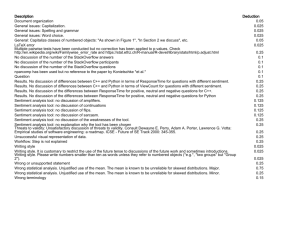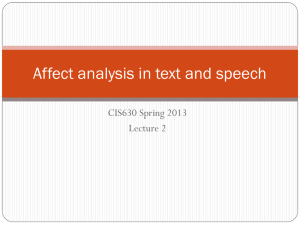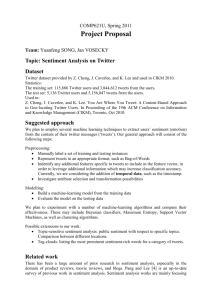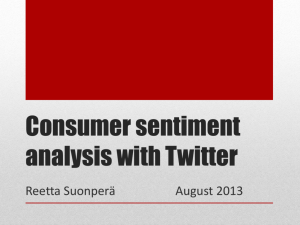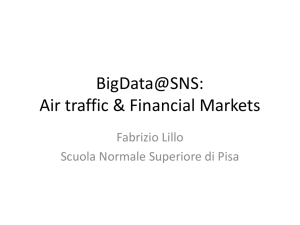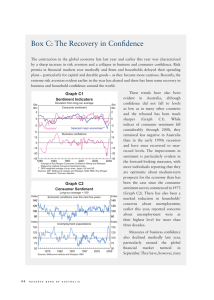SI485i : NLP Set 6 Sentiment and Opinions
advertisement
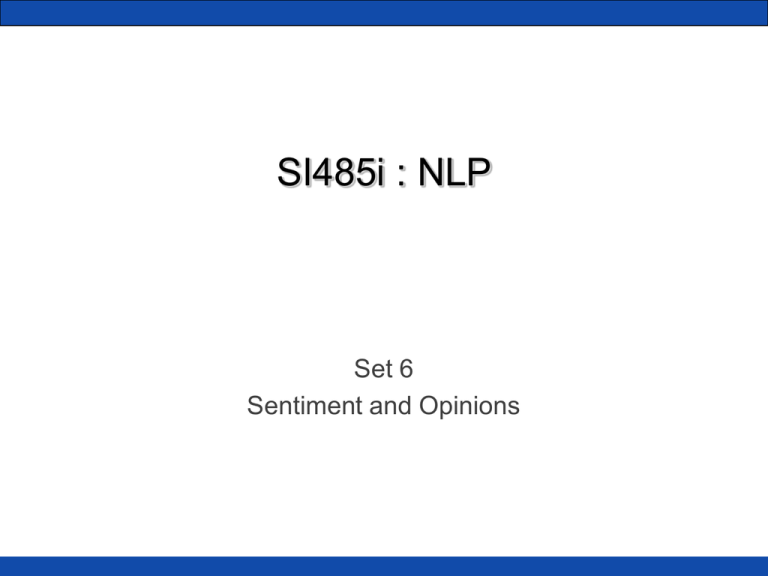
SI485i : NLP Set 6 Sentiment and Opinions It's about finding out what people think... Can be big business… • Someone who wants to buy a camera • Looks for reviews online • Someone who just bought a camera • Writes reviews online • Camera Manufacturer • Gets feedback from customers • Improves their products • Adjusts Marketing strategies Online social media sentiment apps ● Try a search of your own on one of these: ● SocialMention: http://socialmention.com/ ● Twitter sentiment http://twittersentiment.appspot.com/ – ● ● ● (my old students, possibly not working anymore?) TweetFeel: www.tweetfeel.com Easy to search for opinions about famous people, brands and so on Hard to search for more abstract concepts, perform a nonkeyword based string search Why are these sites unsuccessful? • They only work at a very basic level • They only use dictionary lookups for positive/negative words. • Tweets are classified without regard to the search terms Whitney Houston wasn't very popular... Or was she? Opinion Mining for Stock Market Prediction ● ● ● It might be only fiction, but using opinion mining for stock market prediction has been already a reality for some years Research shows that opinion mining outperforms event-based classification for stock trend prediction [Bollen2011] At least one investment company currently offers a product based on opinion mining Twitter for Stock Market Prediction “Hey Jon, Derek in Atlanta is having a bacon and egg, er, sandwich. Is that good for wheat futures?” Derwent Capital Markets ● ● ● Derwent Capital Markets have launched a £25m fund that makes its investments by evaluating whether people are generally happy, sad, anxious or tired, because they believe it will predict whether the market will move up or down. Bollen told the Sunday Times: "We recorded the sentiment of the online community, but we couldn't prove if it was correct. So we looked at the Dow Jones to see if there was a correlation. We believed that if the markets fell, then the mood of people on Twitter would fall.” "But we realised it was the other way round — that a drop in the mood or sentiment of the online community would precede a fall in the market.” May 2013 Sometimes science is hype • The Bollen paper has since been strongly questioned by others in the field. • It contained some overuse of statistical significance tests that could have overestimated how well sentiment actually aligned with market movements. • Nobody has been able to recreate their findings. Accuracy of twitter sentiment apps ● ● Mine the social media sentiment apps and you'll find a huge difference of opinions about Pippa Middleton: ● TweetFeel: 25% positive, 75% negative ● Twendz: no results ● TipTop: 42% positive, 11% negative ● Twitter Sentiment: 62% positive, 38% negative Try searching for “Assad” and you may be surprised at some of the results. ● (same thing happened with “Gaddafi” last year) Why is sentiment analysis wrong? • Most sentiment systems judge the text as a whole • I’m soooo happy that Army lost to Stanford yesterday! • We might only care about a single word in the text, so judging the entire text is the wrong approach. • Contextual Sentiment Analysis: the sentiment of language toward a particular word/phrase • Overall text: positive • Army: negative Harihara, Yang, Chambers. USNA: A Dual-Classifier Approach to Contextual Sentiment Analysis. 2013. Opinion spamming Predicting other people's decisions ● It would be useful to predict what products people will buy, what films they want to see, or what political party they'll support http://www.usna.edu/Users/cs/nchamber/mood-of-nation/ Track Population Moods Monitor Real-World Events Methods for Opinion Mining ● So how does sentiment analysis work? 1. Sentiment Lexicons 2. Machine Learning Types of Sentiment • Typically three classes: 1. Positive 2. Negative 3. Neutral • Sometimes split into three classes a little more formally: 1. Objective statements 2. Subjective statements • Positive • Negative Fine-Grained Sentiment • But sentiment can definitely be more fine-grained! • LIWC2007 (linguistic inquiry and word count) 1. 2. 3. 4. 5. 6. 7. 8. 9. 10. 11. 12. Future orientation Past orientation Positive emotion Negative emotion Sadness Anxiety Anger Tentativeness Certainty Work Achievement Money Sentiment Lexicons ● Lexicon: a list of words with sentiment scores/weights ● OpinionFinder ● ● 2006 positive words, 4783 negative words ● http://www.cs.uic.edu/~liub/FBS/sentiment-analysis.html SentiWordnet ● ● Attaches scores to WordNet concepts SentiStrength ● A program that scores words for you ● http://sentistrength.wlv.ac.uk/ OpinionFinder POSITIVE WORDS • appeal • appealing • applaud • appreciable • appreciate • appreciated • appreciates • appreciative • appreciatively • appropriate • approval • approve • ardent NEGATIVE WORDS • attack • attacks • audacious • audaciously • audaciousness • audacity • audiciously • austere • authoritarian • autocrat • autocratic • avalanche • avarice Sentiment Lexicons ● What do we do with a lexicon? ● ● Count positive and negative words in your text What if your text has both positive and negative words? ● Use word weights to differentiate ● Label as both positive and negative ● Is it subjective or objective? Lexicons: the bad • Lexicons tend to contain general sentiment • Not targeted to your domain • Is “austere” always a negative mood? • “bad” is usually negative word, unless it is about the movie, “The Good, The Bad, and The Ugly” • What to do? • Learn your own lexicon! Learn a Lexicon 1. Find some data that is labeled • Movie reviews have star ratings • Manually label data yourself (doesn’t always take as long as you think) • Use a noisy label, such as “#angry” on tweets 2. Learn a model from the labeled data • • • • Naïve Bayes Classifier MaxEnt Model (you have not yet learned) Decision Trees etc. Learning Algorithms do Matter • Machine Learning and AI • This class will not teach all algorithms What features do we use? • Sentiment analysis is a type of text classification task. • Use many of the same features you’d normally use. • However, emotion is often conveyed in other types of words, such as adjectives, that might not help typical classification tasks. • Negation is a big deal. • “I am not happy that the phone did not work.” • Discourse now matters: • “Are you happy?” • “You are happy!” Contextual Sentiment Analysis Contextual Sentiment Analysis 1. Find text about a specific topic 2. Learn a lexicon of sentiment words using only that text 3. Label new text with sentiment 4. Profit! Contextual Sentiment Analysis • Problems • Keyword search for a topic is crude and often wrong • Even if keyword works, which text is positive or negative? • Solutions • Hand label text for your topic. Naïve Bayes classifier. • Hand label text for sentiment. Naïve Bayes classifier. Contextual Sentiment Analysis • Harder problem: • Are the sentiment words targeted at your topic? “I am so mad at my mom, she won’t let me see Bieber in concert!!!!! Aaaaaaaaaaaaaaaaaahhh hhhhh!” Contextual Sentiment Analysis • Solutions to targeted problem: • Need deeper language understanding • Need syntax of words “mad at mom” not “mad at bieber” • Need robust word knowledge: “aaaaaaaahhhhhh” means frustration. • We will soon cover syntactic parsing. • We will most likely cover robust word learning too! USNA’s own research • Learning for microblogs with distant supervision: Political Forecasting with Twitter • Marchetti-Bowick and Chambers. EACL 2012. 1. 2. 3. 4. 5. Do a keyword search on McCain and Obama Build a political classifier. Do a keyword search for smiley faces :) and :( Build a sentiment classifier. Run two classifiers, add up the result. Be careful… • Topic classifiers might only reflect the general mood and mislead you. • Big finding: political forecasting works well on Twitter as a whole, not just on tweets about politics. • “Do people like your product? Or are they just in a good mood today?” The Future • Unknown. This is a new field (< 10 years). • We still see wild claims about effectiveness. • Challenge: making sentiment more precise, both in definition, and in classification • Challenge: identify the sentiment you care about, directed at your topic of interest • Possible class project ideas?
